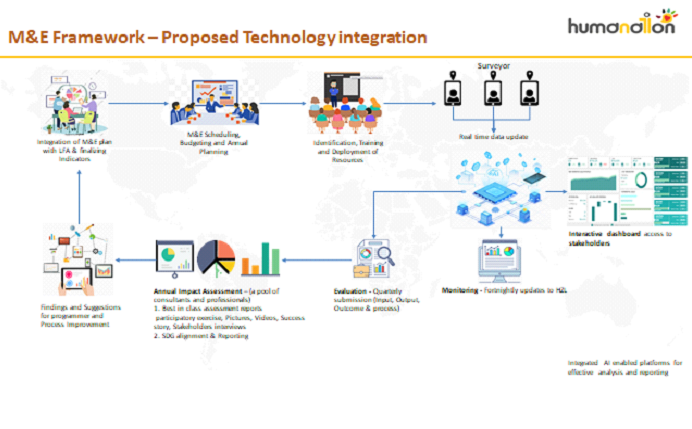CSR Monitoring and Evaluation
Monitoring and evaluation are important components of project management. Monitoring helps to track progress, ensure resources are being used effectively, and determine if the project is on track to meet its goals. Evaluation, on the other hand, is a formal assessment of a project’s performance and impact, which is conducted at the end or mid-term of the project. This process compares the project’s actual results with its original goals and objectives, and helps to identify areas for improvement and make necessary changes to the project strategy.

Why rely on us for your baseline surveys and assessments?
M & E can help one to
- identify problems and their causes;
- recommend possible solutions to problems;
- raise questions about project assumptions and strategies that were outlined in the initial project proposal; and
- reflect on where the project is going, and on how best to accomplish its aims and objectives.
The power of measuring results through M&E
- If you do not measure results, you cannot tell success from failure.
- If you cannot see success, you cannot reward it.
- If you cannot reward success, you are probably rewarding failure.
- If you cannot see success, you cannot learn from it. • If you cannot recognise failure, you cannot correct it.
- If you can demonstrate results, you can win public support and donor interest.
Through routine data gathering, monitoring aims at:
The purpose of monitoring and evaluation in project management is multi-faceted, and can include:
- Assessing project implementation and progress
- Providing regular feedback for learning and improvement
- Improving effectiveness of project interventions
- Increasing accountability with stakeholders
- Identifying strengths, weaknesses, and areas for improvement
- Making adjustments and taking corrective actions as needed
- Ensuring project relevance for target group
- Measuring project performance against expected results.

Evaluation provides important insights into the effectiveness and impact of a project, and helps to identify areas for improvement. The evaluation process includes a thorough review of project design, implementation, and results, and helps to determine if the project met its goals and objectives. The findings from the evaluation can be used to make necessary changes and adjustments to the project strategy, and to ensure future projects are more effective and impactful.
Evaluation includes:
- looking at the aims and objectives of the project (What difference did this project set out to make? What impact should it have had?);
- assessing the progress made towards what we wanted to achieve at the outset;
- looking at the strategy chosen to implement the project (Did the strategy work? If not, why not?); and assessing whether or not funds were used efficiently.

